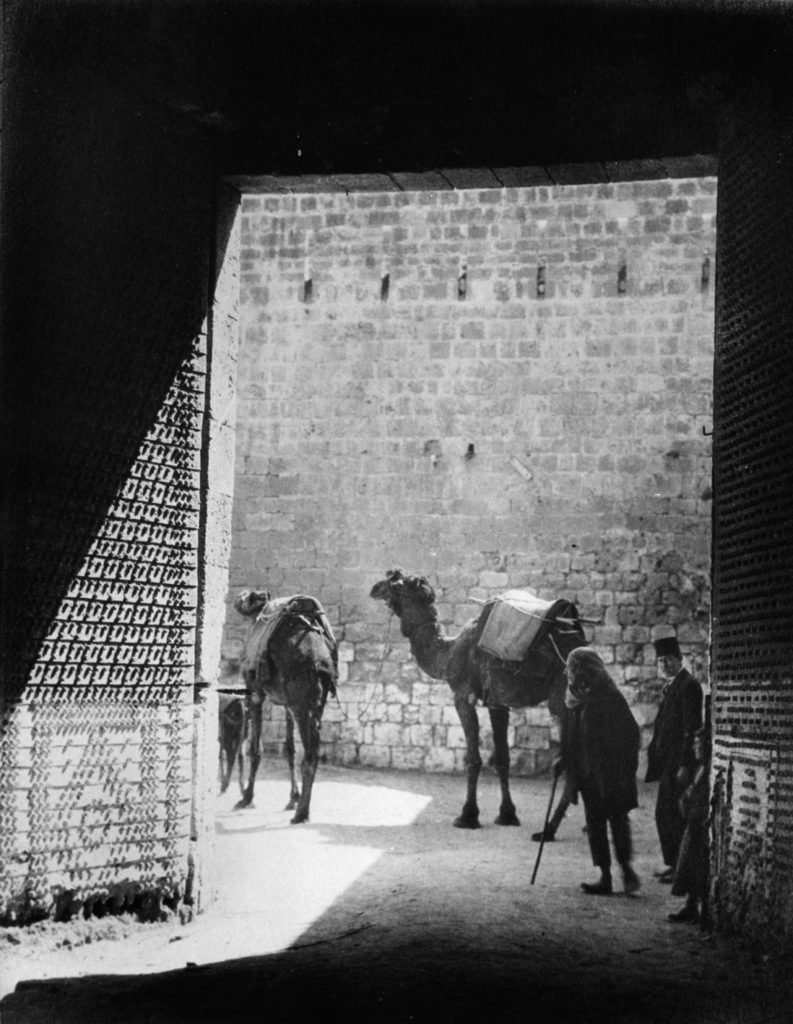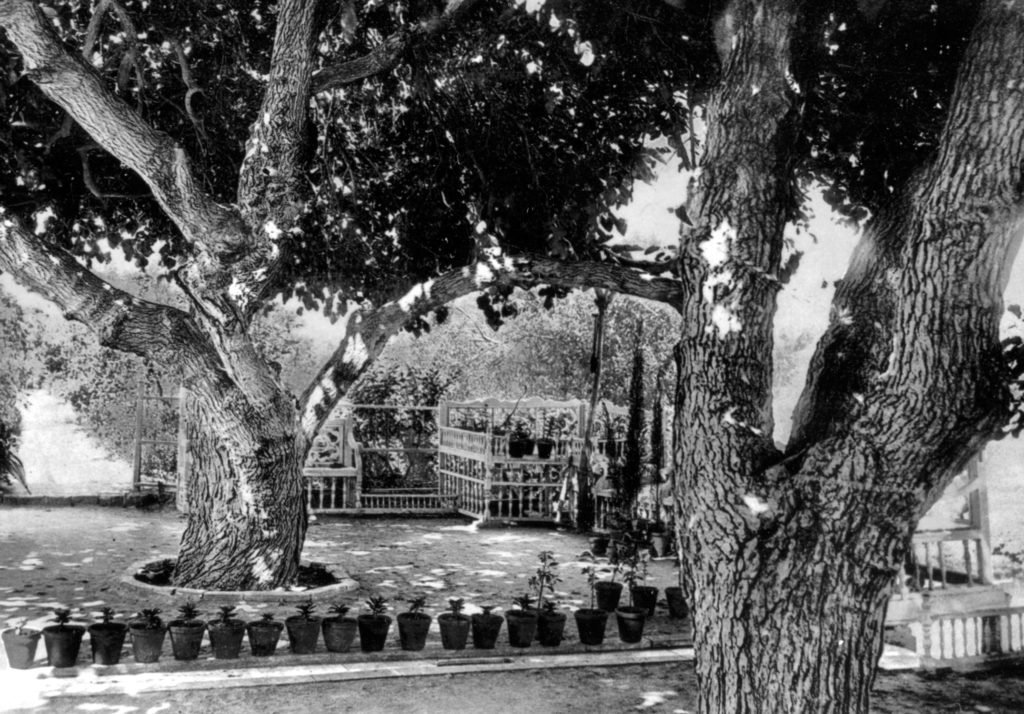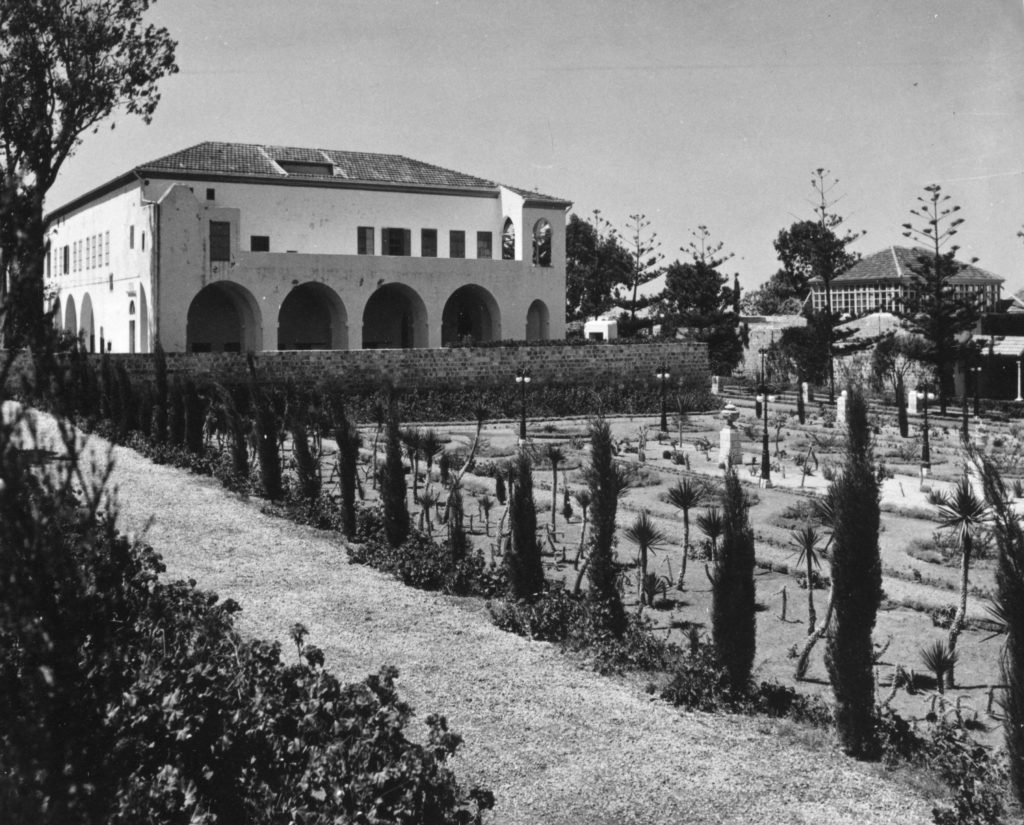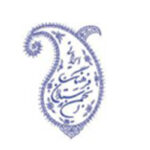“Remember My days”
People across the globe are struggling to learn new terms and new behaviours – social/physical distancing, self-isolation, going into quarantine. With more and more workers, school children, caregivers and the elderly confined to their homes in response to public health advisories, many face wholly unexpected challenges and needs, some feeling frightened, even ‘imprisoned,’ by these new conditions. Amidst them, Bahá’u’lláh’s counsel from the Tablet of Ahmad seems especially compelling: “Remember My days during thy days, and My distress and banishment in this remote prison.” So, too, the closing words of the Fire Tablet: “…thank thy Lord for this Tablet, whence thou canst breathe the fragrance of My meekness, and know what hath beset Us in the path of God, the Adored of all the worlds…”

The land gate of ‘Akka from inside the city. Bahá’u’lláh left through this gate. c. 1921. Photo: Bahá’í International Community
After His imprisonment in the Siyáh-Chál in Tihran, Bahá’u’lláh was exiled successively to Baghdad, Constantinople, Adrianople and finally the prison-city of ‘Akká. In Baghdad attacks against the Blessed Beauty and His followers rained down from outside the community. In Adrianople, a devastating crisis erupted from within. In ‘Akká the onslaught was both external and internal. “ ‘Know thou,’ Bahá’u’lláh, wishing to emphasize the criticalness of the first nine years of His banishment to that prison-city, has written, ‘that upon Our arrival at this Spot, We chose to designate it as the ‘Most Great Prison.’ Though previously subjected in another land (Ṭihrán) to chains and fetters, We yet refused to call it by that name. Say: Ponder thereon, O ye endued with understanding!”[i]
Throughout the first year of their confinement in ‘Akká, the band of exiles were forcibly separated, forbidden to associate either with one another or with local residents. Only Bahá’u’lláh’s wives and children were permitted to be with Him. For nearly a decade, the Guardian states, He did not pass beyond the city walls, His sole exercise pacing, “in monotonous repetition, the floor of His bed-chamber.”[ii] Bahá’u’lláh was gradually allowed some freedom of movement within ‘Akká and later outside its walls to Mazra’ih and Bahjí though He remained nominally a prisoner to the end of His life. Slowly the Bahá’í community grew and pilgrims gained access to the Object of their hearts’ desire. Shared here are excerpts from published accounts by some of those privileged to be with Bahá’u’lláh, offering a glimpse of His days through the eyes and hearts of those fortunate ones.
– – –
“Describing His confinement in the Siyáh-Chál, the Blessed Beauty recalled: ‘The weight of the chain placed about Our neck was difficult to bear [The heaviest chain used weighed over 50 kilos], but having the thumbs of both hands bound together behind the back was even more aggravating. The royal guards were unyielding, but the executioners would show us kindness. One even offered Me tea and some grapes, but as I was freighted with chains and My hands were bound, I was unable to accept them.’
Continuing His recollections Bahá’u’lláh said: ‘To whatever place We were banished, difficulties ensued similar to those experienced after Our arrival in ‘Akká. Now, however, the situation is reversed so that people here are inclined towards meekness. It has been like this wherever We have dwelt. At first the Cause of God was unknown and We were engulfed in tribulations. But now, praise be to God, the people of these regions are manifesting their humility and respect towards Us.’ ”[iii]
– – –
Hájí Muhammad-Táhir-i-Málmírí has described the following episode in his memoirs:
“One evening when the Blessed Beauty was staying in the home of Jináb-i-Kalím, He was pacing up and down the courtyard and I was busy watering the small garden with a watering can. His blessed Person came to me, reached for my shawl which was loosely tied around my waist, and said, ‘This is loose, a Bábí ought to gird up his loins!’ He then stood beside me for a short while and uttered words of loving-kindness to me.’
This is an example of how Bahá’u’lláh always made His loved ones feel easy in His presence.
When on a visit to ‘Akká, Bahá’u’lláh occasionally visited the homes of His companions. This was a great honour that He bestowed on His loved ones. The same Hájí Muhammad-Táhir has recorded the following story:
‘My residence, together with that of Nabíl-i-A’zam, was close to the home of Áqáy-i-Kalím which was situated in the Súq-i-Abyad. Since I used to bid beads (it was a custom among the Persians to choose at random a number of beads, and by counting them in a certain manner determine which course of action would be best to follow in a given situation) quite frequently, one day Nabíl seized my prayer beads and hung them high up from the ceiling so that I could not reach them. That day I was staying in his room as his guest when the Blessed Beauty arrived and honoured us with His presence. He asked Nabíl in an amused tone, ‘Whose prayer beads are those that you have imprisoned here?’ Nabíl said, ‘They belong to Áqá Táhir…’ ”[iv]
– – –
“Varqá’s two children, ‘Azízu’lláh and Rúhu’lláh who accompanied him to ‘Akká also had the honour of attaining the presence of Bahá’u’lláh several times. Contact with the Supreme Manifestation of God left an abiding impression on their souls. Though young in age they both became charged with the spirit of faith. Rúhu’lláh in particular flourished spiritually in those holy surroundings. He may be regarded as one of the spiritual prodigies which the hand of God has raised up in this Dispensation. Although He was only about eight years old when He came into the presence of Bahá’u’lláh, his understanding of the Faith was very profound.
To cite one example: One day Bahá’u’lláh asked Rúhu’lláh, ‘What did you do today?’
He replied, ‘I was having lessons from – [a certain teacher].’
Bahá’u’lláh asked, ‘What subject were you learning?’
‘Concerning the return [of the prophets],’ said Rúhu’lláh.
‘Will you explain what this means?’ Bahá’u’lláh demanded.
He replied: ‘By return is meant the return of realities and qualities.’
Bahá’u’lláh, questioning him further, said: ‘These are exactly the words of your teacher and you are repeating them like a parrot. Tell me in your own words your own understanding of the subject.’
‘It is like cutting a flower from a plant this year,’ answered Rúhu’lláh. ‘Next year’s flower will look exactly like this one, but it is not the same.’
The Blessed Beauty praised the child for his intelligent answer and often called him Jináb-i-Muballigh (His honour, the Bahá’í teacher).
On another occasion Bahá’u’lláh asked Rúhu’lláh how he spent his time at home. He answered, ‘We teach the Faith and tell the people that the “Promised One” has come.’
Bahá’u’lláh, obviously enjoying this conversation, then asked him what he would do if it were found that the Message of the Báb was not authentic and the true Promised One appears.
‘I would try to teach him the Faith,’ was his prompt reply.
One day the Greatest Holy Leaf noticed that Rúhu’lláh and his older brother ‘Azízu’lláh were playing in the garden. She called them in and they sat in her presence. Also present were Mírzá Badí’u’lláh and Mírzá Diyá’u’lláh, the two sons of Bahá’u’lláh who later joined hands with Mírzá Muhammad-‘Alí, the Arch-breaker of the Covenant of Bahá’u’lláh. The Greatest Holy Leaf, often referred to as ‘Khánum,’ asked them what they said to people when teaching the Faith.
‘We tell them,’ Rúhu’lláh answered, ‘that God has manifested Himself.’
Surprised at this remark, Khánum told them that surely they could not say such a thing straight away to people!
‘We don’t tell this to everybody,’ responded Rúhu’lláh, ‘we only say it to those who have the capacity to hear such a statement.’
‘How would you know such people?’ ask Khánum. ‘We look into their eyes and then know whether we can give them the Message,’ replied Rúhu’lláh.
Khánum laughed heartily and then beckoned Rúhu’lláh to come close and look into her eyes to find out whether she had the capacity for hearing such words. In obedience to her request Rúhu’lláh sat down opposite the Greatest Holy Leaf, looked intently into her eyes and then said, ‘You already believe in these words.’ Then it was the turn of the two sons of Bahá’u’lláh. Rúhu’lláh went close to them, looked searchingly into their eyes and sadly said to Khánum, ‘They are not worth looking into!’[v]
– – –
“To see His Father, the Blessed Beauty, after so many years of hardship and suffering, resting under the mulberry tree by the little stream in the beautiful Ridván Garden would rejoice the heart of ‘Abdu’l-Bahá. The fragrant, profuse and multi-coloured flowers and shrubs, the splashing fountain, the freshness of the air, and especially the presence of Bahá’u’lláh uplifted the souls of all who were privileged to accompany Him.
The greatest joy of the children of the Holy Family was to go with Bahá’u’lláh for occasional picnics in the Garden. For them He as like another Father, and to Him they carried their small difficulties.
The Riḍván Garden, located outside the city of ‘Akká, was rented and prepared by ‘Abdu’l-Bahá for Bahá’u’lláh’s use. Photo: Bahá’í International Community
The Blessed Beauty was interested in everything concerning the children, particularly their cleanliness, order and discipline. All their treats and happiness came from Him during those often monotonous days. When boxes of sweets were brought to Bahá’u’lláh, He would humorously say, ‘Set aside some for the children, otherwise the Master will give them away’, and sometimes He would send for them and distribute the sweets.
Often at bedtime, despite their parents’ wish not to disturb Bahá’u’lláh, He would always welcome them with loving words. And when He would tell them, ‘Tomorrow, children, you shall come with Me to the Garden of Ridván,’ they were so filled with joy they could scarcely sleep.”[vi]
– – –
The following are summarized extracts from the recollections of Hand of the Cause, Taráz’u’lláh Samandari, who, at the age of 16, attained the presence of Bahá’u’lláh. He stayed in ‘Akká for six months before the Ascension of Bahá’u’lláh in May 1892 and for one month afterwards.
“It was in the House of ‘Abbúd that Mr. Samandarí first entered the presence of Bahá’u’lláh. This is his description of that visit:
‘[When I entered His room], the Blessed Beauty was seated on a divan. As I bowed before Him, the fez I was wearing tumbled from my head. With His blessed hands, Bahá’u’lláh placed it back on my head, and said, “Marhabá!” [Welcome!]. My trembling and shaking were uncontrollable. He bade me be seated, and an attendant, at the request of Bahá’u’lláh, offered me some tea. But I was shaking so much that I could scarcely hold on to the cup.
‘Bismilláh! Bismilláh!’ [Please!] Bahá’u’lláh repeated several times, inviting me to drink my tea, but I was still unable to do so. He enquired about the health of my father, and following this, I was granted permission to leave.[vii]
Since two weeks had passed during which time I had not been in the presence of Bahá’u’lláh, I decided one day to go to the Mansion of Bahjí. I asked a young girl, the daughter of a resident who happened to be there, whether or not anyone was in the presence of the Blessed Beauty at that moment. She replied that He was alone, and that He was walking and pacing to and fro. I said to her, ‘Go and say to Bahá’u’lláh, “It has been two weeks since Taráz has attained Your holy presence and he seeks permission to visit.” ’ The young girl delivered my message and returned with the reply that Bahá’u’lláh says, ‘Bismilláh! Bifarma’id!’ [Enter!]
In a state of mind that I cannot easily describe, I entered His presence. ‘Marhabá! Taráz Effendi’ was the greeting of the Blessed Beauty. He then approached me, and, patting my head and face, enquired about my health. After a few moments, He added, ‘Behold! You have made complaint that you have not entered Our presence. Do you not visit Ghusn-i-A’zam [the Most Great Branch] in the city?’
I replied that day and night I attained His [‘Abdu’l-Bahá’s] presence. Bahá’u’lláh then stated: ‘For what reason, then, did you utter this complaint?’ He then remarked, ‘Your first place of residence is here! Permission to come is yours whensoever you desire, and for your comfort, we have prepared the guest-home.’
Afterwards, He offered me some sweets and granted me permission to leave.”[viii]
– – –
“Now there remained only three nights until the end of my pilgrimage, and I was summoned to the presence of Bahá’u’lláh. He spoke of His exiles and emphasized the fact that should the people ponder carefully on these different stages of His banishment, they would know that every step had been taken according to the Will of God. ‘The hand of God is over all, and His might and power overwhelm the worlds of creation. Consider the case of those persons who, fearing the loss of their temporal powers, condemned Us to the Most Great Prison. Where are they now? What has befallen each and every one of them? God brought them down from their places and consigned them to their graves. Their names are never mentioned. But your Lord is established in this Mansion through the power of God, His might, and His sovereignty.’
He then asked someone to chant parts of the two Tablets addressed to the sultan of the Ottoman Empire and to the shah of Persia. After that, the pilgrims were dismissed.
During our dinner someone brought sweets sent to us by Bahá’u’lláh. He also sent a message concerning me: ‘Tell him to eat the sweets and say to himself, “I must go home.” ’ This time I got ready to go and did not plan to ask the beloved Master to intervene on my behalf or to guarantee me. The sweet memory of His loving wit that I should tell myself, ‘I must go home,’ remains fresh in my heart, and even more as I surrender my will to that of God.
The next day we had torrential rains. In the afternoon of that same day, I went to see Him. The moment I entered His room, He said, ‘It seems that you expect the rain to intercede for you.’ This tender joke helped to change all my despair into joy. When I returned to the Pilgrim House and reported my interview to the friends, they were all of the opinion that the next day there would again be rain, and the Bahá’u’lláh would not send me away.
Mansion of Bahjí and surrounding gardens, 1958. Photo: Bahá’í International Community
But the day dawned with splendid sunshine, and I went to His room in the Mansion of Bahjí. He spoke about teaching. He said: ‘A kindly approach and loving behavior toward the people are the first requirements for teaching the Cause. The teacher must carefully listen to whatever a person has to say – even though his talk may consist only of vain imaginings and blind repetitions of the opinions of others. One should not resist or engage in argument. The teacher must avoid disputes which will end of stubborn refusal or hostility, because the other person will feel overpowered and defeated. Therefore, he will be more inclined to reject the Cause. One should rather say, “Maybe you are right, but kindly consider the question from this other point of view.” Consideration, respect, and love encourage people to listen and do not force them to respond with hostility. They are convinced because they see that your purpose is not to defeat them, but to convey truth, to manifest courtesy, and to show forth heavenly attributes. This will encourage the people to be fair. Their spiritual natures will respond, and, by the bounty of God, they will find themselves recreated.’
‘Consider the way in which the Master teaches the people. He listens very carefully to the most hollow and senseless talk. He listens so intently that the speaker says to himself, “he is trying to learn from me.” Then the Master gradually and very carefully, by means that the other person does not perceive, puts him on the right path and endows him with a fresh power of understanding.’
When the final moment approached and I bade farewell to my Beloved, He approached the door and whispered in my ear, ‘I have entrusted you to the hands of the Master.’ Though these words were spoken with the utmost sweetness, and were a sign of His sublime consideration and love, they filled my heart with dark clouds of sorrow. They seemed to me to indicate clearly His imminent departure from this world.
Next I went to ‘Akká, to the presence of the Master. There was no end of His love. He had written a letter to Bahá’u’lláh requesting that I be permitted to stay, even outside the city of ‘Akká, because the sea had been rough and agitated. His letter had been returned with one sentence on the top: ‘It is better for him to go; God is the Protector – rest assured.’ ”[ix]
[i] Shoghi Effendi, God Passes By, Chapter XI.
[ii] Ibi.
[iii] Stories of Bahá’u’lláh, compiled by ‘Alí-Akbar Furútan, #142, p. 108.
[iv] The Revelation of Bahá’u’lláh Volume 4: Mazra’ih & Bahjí 1877~92, by Adib Taherzadeh pp. 243-244.
[v] Stories of Bahá’u’lláh and Some Notable Believers, compiled by Kiser Barnes, #75, pp. 173-4.
[vi] Stories of Bahá’u’lláh, compiled by ‘Alí-Akbar Furútan, #141, p. 107.
[vii] Stories of Bahá’u’lláh, compiled by ‘Alí-Akbar Furútan, #129, pp. 97-8.
[viii] Stories of Bahá’u’lláh, compiled by ‘Alí-Akbar Furútan, #140, pp. 105-6).
[ix] Stories from the Delight of Hearts: The Memoirs of Hájí Mírzá Haydar-‘Alí, Translated and abridged by A. Q. Faizi, pp. 108-10.
Category: Features, Uncategorized










